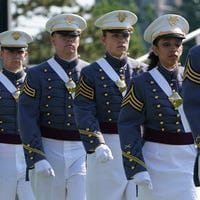The Supreme Court’s recent ruling on affirmative action and its impact on military academies in the ongoing debate surrounding race-conscious admissions, diversity in the officer corps, and the potential implications for national security have been brought to bare.
The recent Supreme Court ruling on affirmative action has sparked a new debate concerning its impact on military academies.
While the court’s majority opinion declared that the consideration of race in college admissions violated the equal protection clause of the Fourteenth Amendment, it explicitly exempted military academies from this ruling.
This decision has prompted Students for Fair Admissions (SFFA), the organization that spearheaded the fight against affirmative action at Harvard and the University of North Carolina, to explore the legality of using race in admissions at institutions such as West Point, Annapolis, and the Air Force Academy.
The implications of this effort could be far-reaching, impacting not only the military but also the broader landscape of higher education.
The Supreme Court’s View On Military Academies
Throughout history, the Supreme Court has deferred to the executive branch on matters of national security.
In past affirmative action cases, the court recognized the significance of a racially diverse officer corps in fulfilling the military’s missions. Justice Sandra Day O’Connor, in her landmark 2003 opinion on affirmative action, emphasized the vital role played by service academies and ROTC programs in cultivating a racially diverse pool of officers. At that time, the court drew a direct connection between military academies and other selective institutions, stating that diversity was essential for both.
However, the recent decision involving Harvard and UNC did not explicitly address military academies. While it remains uncertain how the court perceives these institutions, SFFA and its allies argue that civil rights laws and the Constitution should apply to the service academies, demanding that race should not be a factor in admissions decisions.
Selective Nature Of Military Academies
The federal service academies, including West Point, Annapolis, and the Air Force Academy, are renowned for their selectivity and prestige.
With admission rates of less than 11% at West Point, these institutions attract a large number of applicants who are typically nominated by members of Congress. Due to the intense competition, race has sometimes been considered as one factor in the admissions process.
Additionally, the need for a racially diverse officer corps, crucial for national security, has been acknowledged by military leaders. However, the lack of diversity in the officer ranks, particularly at higher levels, highlights the ongoing necessity for affirmative action in these academies.
The Debate And Potential Impacts
The recent Supreme Court decision has reignited the debate surrounding diversity, equity, and inclusion in the military.
Some lawmakers, primarily from the GOP, have targeted diversity programs in the armed forces, focusing on the military’s exemption from race-based affirmative action. Senator Roger Wicker introduced legislation that aims to prohibit race-based affirmative action specifically in the academies.
On the other hand, progressive lawmakers and advocates express outrage at the court’s decision, arguing that the exemption for military academies reinforces a narrative that Black individuals can sacrifice for the nation but are not afforded the same opportunities in other areas of society.
This contentious issue raises questions about the arbitrary nature of the decision and its potential consequences for diversity, leadership, and institutional legitimacy within the military.
The Importance Of Affirmative Action
Advocates for affirmative action in military academies contend that racial diversity is vital not only for social justice but also for the military’s operational effectiveness.
They argue that restricting educational institutions from employing race-conscious admissions policies could hinder the military’s ability to maintain diverse leadership, potentially undermining its institutional legitimacy.
A racially diverse officer corps contributes to a broader range of perspectives, enhanced decision-making, and a more representative military force that reflects the diverse population it serves.
The Supreme Court’s recent affirmative action ruling has raised significant questions regarding military academies’ treatment in relation to race-conscious admissions. While the court has yet to address this specific issue, the implications of a potential change in policy would be profound.
It is essential to continue the dialogue on diversity, equity, and inclusion, both in military academies and across higher education institutions. Achieving a racially diverse officer corps remains a critical goal for the military, and the broader social implications of this ongoing debate will shape the future of admissions policies in these prestigious institutions.





